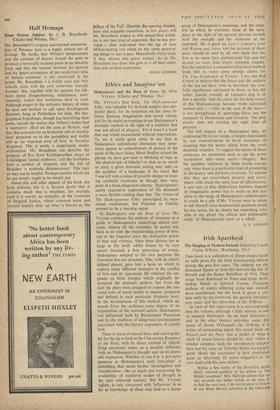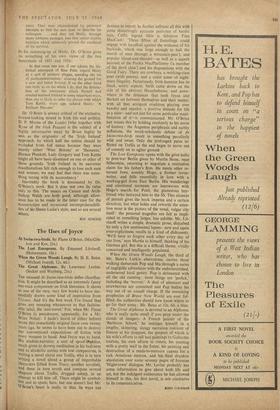Irish Apartheid
This book is a collection of fifteen essays based on talks given for the Irish broadcasting station during the past five years. The subjects are the dominant figures in Irish life between the fall of Parnell and the Easter Rebellion of 1916. They range from Redmond to Yeats and from Arch. bishop Walsh to Edward Carson. Fourteen authors of widely differing styles and outlook have contributed, but the book is given a eel, tain unity by the foreword, the general introduc tory essay and the editorship of Dr O'Brien.
In view of this supervision it is not surprising that the volume, although a little uneven, is one of unusual distinction. As an Irish historian— and in his other literary activities under the name of Donat O'Donnell--Dr. O'Brien is a writer of outstanding talent. His recent book on Parnell,and his Party was a model of what a work of recent history should be; and, within a smaller compass, both his introductory chapter' here and his essay on Timothy Healy are equally good. Healy the excoriator is here excoriated quite as effectively (if more elegantly) as he ever dealt with his own victims : Within a few weeks of his [Parnell's] death Healy referred publicly to his widow as 'the British prostitute.' Mrs. Sullivan admits that on this occasion her father failed, as she puts it, to find the mot juste. 1 do not propose to follow in any detail Healy's activities in the following years. They were characterised by persistent attempts to find the mot juste to describe his colleagues . . . and they led Healy, through many tortuous passages, into that rather shabby isolation which ultimately proved the condition of his survival.
In his summing-up of Healy, Dr. O'Brien gives us something of his own views of the two watersheds of 1891 and 1916: In that sense one Can, if one adopts the his- torical retrospect of Sinn Fein, regard Healy as a sort of salutary plague, speeding the rot of parliamentarianism : clearing the ground for , a new and better Ireland. If on the other hand one feels, as on the whole I do, that the destruc- tion of the movement which Parnell had created maimed Ireland in some important ways, then one is likely to echo the phrase with which Tom Kettle. years ago, saluted Healy: 'A Brilliant Disaster.'
Dr. O'Brien is always critical of the exclusive, inward-looking strand in Irish life and politics. D. P. Moran of the Leader (who together with Ryan of the Irish Peasant is .the subject of a highly informative essay by Brian Inglis) he sees as the originator of the 'Irish Ireland' approach, by which half the nation should be excluded from full status because they were merely either 'West Britons' or `Shoneens.' Horace Plunkett, Lady Gregory and Tom Kettle might all have been dismissed on one or other of these grounds. 'Irish Ireland in its narrower manifestations felt rich enough to lose such men and women; 'we may feel that there was some- thing wrong with its accountancy.'
Inevitably the book is dominated by Dr. O'Brien's work. But it does not owe its value only to this. The essays on Carson and Arch- bishop Walsh are both good, although allow- ance has to be made in the latter case for the eccentricities and occasional incomprehensibili- ties of Sir Shane Leslie's style; and so are several others.
ROY JENKINS























































 Previous page
Previous page